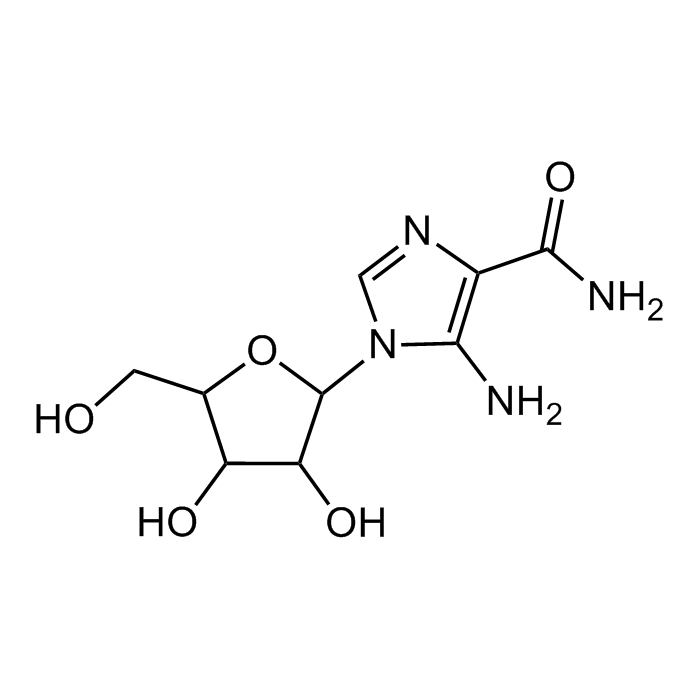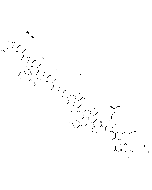Cookie Policy: This site uses cookies to improve your experience. You can find out more about our use of cookies in our Privacy Policy. By continuing to browse this site you agree to our use of cookies.
AdipoGen Life Sciences
AICAR
As low as
30
CHF
CHF 30.00
In stock
Only %1 left
AG-CR1-0061-M01010 mgCHF 30.00
AG-CR1-0061-M05050 mgCHF 60.00
AG-CR1-0061-M100100 mgCHF 100.00

| Product Details | |
|---|---|
| Synonyms | 5-Aminoimidazole-4-carboxamide 1-β-D-ribofuranoside; Acadesine; AICA-Riboside |
| Product Type | Chemical |
| Properties | |
| Formula |
C9H14N4O5 |
| MW | 258.2 |
| Merck Index | 14: 16 |
| CAS | 2627-69-2 |
| Purity Chemicals | ≥98% (HPLC) |
| Appearance | Off-white solid. |
| Solubility | Soluble in water (9 mg/ml), DMSO or dimethyl formamide. |
| Identity | Determined by 1H-NMR. |
| InChi Key | RTRQQBHATOEIAF-UHFFFAOYSA-N |
| Smiles | NC(=O)C1=C(N)N(C=N1)C1OC(CO)C(O)C1O |
| Shipping and Handling | |
| Shipping | AMBIENT |
| Short Term Storage | +4°C |
| Long Term Storage | -20°C |
| Use/Stability | Stable for at least 2 years after receipt when stored at -20°C. |
| Documents | |
| MSDS |
 Download PDF Download PDF |
| Product Specification Sheet | |
| Datasheet |
 Download PDF Download PDF |
Description
- Cell permeable AMP-activated protein kinase (AMPK) activator [1].
- Insulin mimetic [2, 10].
- Adipocyte differentiation inhibitor [3].
- Apoptosis inducer [4, 11].
- PPARα inhibitor [5].
- mTOR inhibitor [6].
- P70S6K inhibitor [6].
- LPS-induced TNF-α production inhibitor [7].
- TORC2 phosphorylation inducer [8].
- Anti-inflammatory [9].
- Anti-tumor compound [12].
- Autophagy inhibitor [13].
- HSP90 inhibitor [14].
- Autophagy inducer [15]
Product References
- 5-aminoimidazole-4-carboxamide ribonucleoside. A specific method for activating AMP-activated protein kinase in intact cells?: J. M. Corton et al.; Eur. J. Biochem. 229, 558 (1995)
- 5-aminoimidazole-4-carboxamide riboside mimics the effects of insulin on the expression of the 2 key gluconeogenic genes PEPCK and glucose-6-phosphatase: P. A, Lochhead et al.; Diabetes 49, 896 (2000)
- The effects of AICAR on adipocyte differentiation of 3T3-L1 cells: S. A. Habinowski et al.; Biochem. Biophys. Res. Commun.286, 852 (2001)
- 5-Aminoimidazole-4-carboxamide riboside induces apoptosis in Jurkat cells, but the AMP-activated protein kinase is not involved: J. M. Lopez et al.; Biochem. J. 370, 1027 (2003)
- Kinase-independent transcriptional co-activation of peroxisome proliferator-activated receptor alpha by AMP-activated protein kinase: M. Bronner et al.; Biochem. J. 384, 295 (2004)
- AMP-activated protein kinase activators can inhibit the growth of prostate cancer cells by multiple mechanisms: X. Xiang et al.; Biochem. Biophys. Res. Commun. 321, 161 (2004)
- 5-Aminoimidazole-4-carboxamide riboside suppresses lipopolysaccharide-induced TNF-alpha production through inhibition of phosphatidylinositol 3-kinase/Akt activation in RAW 264.7 murine macrophages: B. S. Jhun et al.; Biochem. Biophys. Res. Commun.318, 372 (2004)
- The CREB coactivator TORC2 is a key regulator of fasting glucose metabolism: S. H. Koo et al.; Nature 437, 1109 (2005)
- 5-aminoimidazole-4-carboxamide-1-beta-4-ribofuranoside inhibits proinflammatory response in glial cells: a possible role of AMP-activated protein kinase: S. Giri, et al.; J. Neurosci. 24, 479 (2004)
- 5-aminoimidazole-4-carboxamide ribonucleoside (AICAR) inhibits insulin-stimulated glucose transport in 3T3-L1 adipocytes: I.P. Salt, et al.; Diabetes 49, 1649 (2000)
- AICAR induces apoptosis independently of AMPK and p53 through up-regulation of the BH3-only proteins BIM and NOXA in chronic lymphocytic leukemia cells: A.F. Santidrian, et al.; Blood 116, 3023 (2010)
- AICAR inhibits cancer cell growth and triggers cell-type distinct effects on OXPHOS biogenesis, oxidative stress and Akt activation: C. Jose, et al.; Biochim. Biophys. Acta 1807, 707 (2011)
- Role of AMP-activated protein kinase in autophagy and proteasome function: R. Viana, et al.; BBRC 369, 964 (2008)
- Small-molecule targeting of heat shock protein 90 chaperone function: rational identification of a new anticancer lead: M. Meli, et al.; J. Med. Chem. 49, 7721 (2006)
- AMPK promotes skeletal muscle autophagy through activation of forkhead FoxO3a and interaction with Ulk1: A.M. Sanchez, et al.; J. Cell. Biochem. 113, 695 (2012)
- AMPK Activation by Zyflamend: A novel pathway regulating metabolism and growth in prostate cancer: A.F. MacDonald; Master's Thesis, University of Tennessee (2017)
- Gene-by-environment interactions that disrupt mitochondrial homeostasis cause neurodegeneration in C. elegans Parkinson’s models: H. Kim, et al.; Cell Death Dis. 9, 555 (2018)
- AMPK activity is required for the induction of anhydrobiosis in a tardigrade Hypsibius exemplaris, and its potential up‐regulator is PP2A: K. Kondo, et al.; Genes Cells, ahead of print (2019)






